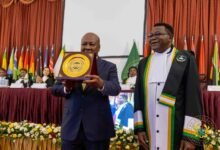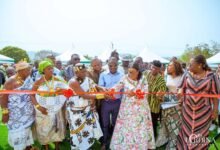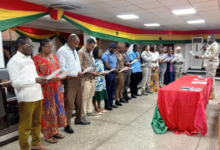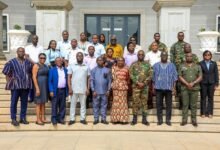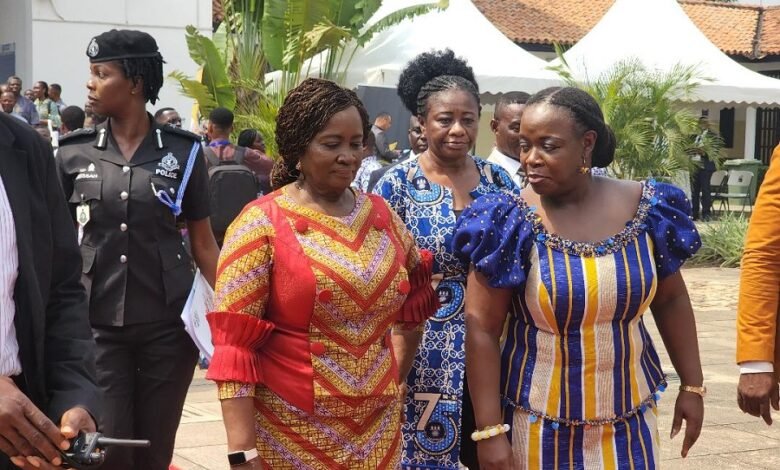
The VICE president, Professor Naana Jane Opoku-Agyemang has reiterated the government’s commitment to providing opportunities for citizens to enjoy sustainable growth at all levels, both economic and beyond.
She said the government remained focused on creating an enabling environment that ensures prosperity, reduces poverty, and fosters economic independence for all Ghanaians.
Opening the 76th Annual New Year School and Conference in Accra, she underscored the importance of protecting and restoring ecosystems to reverse the degrading effects of activities such as illegal mining and wetlands encroachment, which threaten water bodies and soil fertility.

Vice President Professor Naana Jane Opoku-Agyemang (fourth left) with dignitaries after the opening ceremony
She stressed that achieving these goals required collective commitment to sustain the planet for future generations.
“Our ability to build inclusive societies for sustainable development lies in living peacefully with ourselves and our neighbours,” Prof. Opoku-Agyemang noted, adding that partnerships were crucial for mobilising resources, sharing knowledge, and implementing effective strategies.
The three-day event is being organised by the School of Continuing and Distance Education, College of Education of the University of Ghana in partnership with the Institute for Democratic Governance (IDEG), on the theme “Attaining the 5-Ps of Sustainable Development for a Resilient Ghana: People, Planet, Prosperity, Peace and Partnership”.
The Vice President called on stakeholders, including government, the private sector, and local communities, to adopt innovative solutions to address the challenges posed by illegal mining and other harmful practices, particularly in the agricultural sector.
She emphasised that sustainable policies and collaborations were essential to overcoming these environmental and social risks.
Despite Ghana’s limited financial resources, the Vice President said this should not deter efforts to achieve transformative change.
She stressed the potential of local initiatives and strategic partnerships to drive growth, urging stakeholders to leverage technology and foster collaboration between the public and private sectors.
One of the key pillars of sustainable development, she said, was resilience, a trait deeply rooted in the Ghanaian people. “Even in the face of adversity, Ghanaians consistently rise above challenges and push forward with determination.”
She called on all citizens to harness this resilience in pursuit of sustainable development, noting that the deliberations and outcomes of the conference would play a crucial role in shaping Ghana’s national agenda.
“We owe ourselves the honour of working hard to ensure these pillars of sustainable development guide our developmental agenda,” she added.
On his part, Executive Director of the IDEG, Dr Emmanuel Akwetey, touched on the need for a “transformative approach” to Ghana’s local government system to ensure it delivered development to all segments of society.
He emphasised the importance of strengthening the framework for local governance to make it more inclusive and development-oriented.
Dr Akwetey pointed out the ongoing debate about whether the local government system was meeting the needs of the citizenry, adding that the expectations were particularly high under the current administration, given the President’s earlier commitment to reforms in the local governance structure.
He recalled a conversation with the President during last year’s New Year session on governance reforms, during which the then-candidate expressed his party’s commitment to transitioning to a non-partisan election of Metropolitan, Municipal, and District Chief Executives (MMDCEs).
This proposal, he said aimed at strengthening local governance, has since raised critical questions about its potential to transform the system.
“Will the election of MMDCEs on a non-partisan basis make local government more inclusive, heavily development-oriented, and ultimately increase citizen participation in local elections?” Dr Akwetey queried.
He observed that voter turnout in local government elections had remained low over the past three decades, averaging 35 per cent since 1992.
This year, he said saw the lowest turnout, with figures ranging between 63 per cent and 64 per cent, raising concerns about citizens’ disillusionment with service delivery and their aspirations at the grassroots level.
He concluded by encouraging widespread participation, adding that “Let us all be curious and actively engage in this important discussion. Your contributions are vital to charting the way forward.”
BY RAISSA SAMBOU



